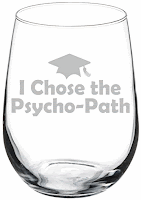So, what we need here is some sort of published review of the topic, which I can then summarize for you. The publication I have chosen for this purpose is from 2020: Wine psychology: basic & applied (by Charles Spence).
To quote some of the important points from the text:
This review paper highlights how basic cognitive research can help understand, and thereafter modify, the way in which people respond to wine. The emerging body of research has led to a growing awareness of just how much a wide variety of cognitive and perceptual factors ... influence the wine–drinking experience, both in wine experts and regular consumers alike.
Wine is a complex, culture–laden, multisensory stimulus, and our perception / experience of its properties is influenced by everything from the packaging in which it is presented through the glassware in which it is served and evaluated.
The perception of wine itself, and the wine–tasting experience more generally, have been shown to be influenced by everything from the weight of the wine bottle through to the sound made by its closure and the glass from which it is drunk, and on to the wine’s visual appearance and the multisensory environment / atmosphere in which it happens to be consumed.
Researchers working in a diverse range of disciplines from marketing to sensory science, and from cognitive neuroscience to packaging design and economics, have started to become increasingly interested in the consumer’s response to wine, be it in terms of the latter’s purchase behaviour or their perceptual response on tasting a wine.
A growing body of experiential wine research now demonstrates that a number of contextual factors, including everything from the colour of the ambient lighting through to background music, can exert a profound, and in some cases predictable, influence over the tasting experience.
Sonic seasoning — that is, the matching of music or soundscapes with specific wines — in order to accentuate or draw attention to certain qualities / attributes in the wine, such as sweetness, length, or body, also represents a rapidly growing area of empirical study.
Not unexpectedly, the review paper also notes that:
No matter whether one is talking about the impact of colour, glassware, packaging, branding, label design, closure type, pricing, or perceptual expertise, there is just so much more research in the world of wine than in any of the world’s other more popular drinks such as, for example, coffee, tea, beer, or water.Indeed, it has been claimed (by Gordon Shepherd) that drinking wine “engages more of our brain than any other human behaviour”. This is, of course, a reference to sensory perception and its interpretation, not to any inherent intellectual characteristics of wine drinkers!
In this sense, it is particularly stressed that the context, or situation / atmosphere, in which a wine is drunk can have a notable effect on the actual tasting experience. Some of you may know this as the Provençal rosé paradox, in which a wine that tastes great while on holiday often tastes much less enjoyable when sampled again afterwards at home. In a similar vein, there can be significant differences between bottles of the same wine; and, because wine is usually in a slow state of change, it is next to impossible to replicate exactly the conditions of any previous formal study (such as an organized wine tasting).
Apparently, much of the current study of the psychology of wine tasting seems to revolve around two things: lighting and music. For example, based on a particular published experiment:
The results revealed that the wine was rated as tasting significantly fruitier under red than under green lighting.Perhaps more interestingly, there is also:
an emerging body of laboratory research documenting first that people intuitively match basic tastes, such as sweet, sour, bitter, and salty with particular musical attributes, and thereafter that playing music (or soundscapes) with matching or mismatching sonic properties can influence people’s ratings of the taste / flavour of a variety of foods.A different review article, (Multisensory experiential wine marketing) delves further into the topic of music and wine, which sounds fascinating (no pun intended!):
The pairing of wine with music goes back a long way, starting out with commentators at first merely just using musical metaphors in order to describe the wines they were writing about. In recent years, however, this area of interest has morphed into a growing range of multisensory tasting events in which wine and music are paired deliberately in order to assess, or increasingly to illustrate, the impact of the latter on people’s experience of the former. Initial isolated small-scale and often anecdotal reports of music supposedly changing the taste of wine have since evolved into large-scale experiential, experimental, events.
On the other hand, this idea (from the original article cited above) may surprise you:
The research clearly shows that if the taster does not know which wine glass they are evaluating a wine in / from [then] the glassware seems to make little difference to the taster’s experience. However, as soon as the latter become aware of the nature of the glass from which they are tasting, the glassware can suddenly make a huge difference to the tasting experience.So, the psychology of tasting wine is complex, and you therefore need to get the conditions right. That is, to put it formally, this: “might also make one wonder how much of what goes on in, and is written about, the world of wine is some kind of social construction based on expectations rather than necessarily reflecting a genuine perceptual effect”. It might also make us wonder about the pronouncements of so-called experts, which I will look at in a later post (Part 2 of this post can be found here: The psychology of wine tasting, part II).




No comments:
Post a Comment